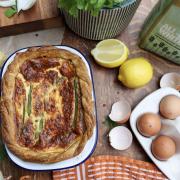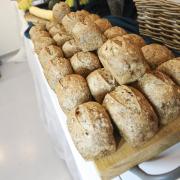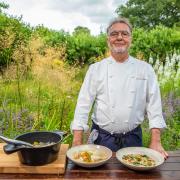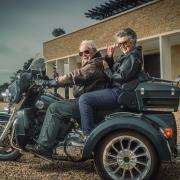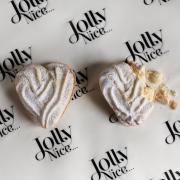I like Stroud Brewery. I like their beer and I like that they are organic and have a beautifully neat history of being planet friendly. I need not do much more than have a few of their cans in my recycling bin to convince myself and my neighbours that I care about the environment. But, after some reflection, I felt I had some rather unearned eco-smugness and wanted to know exactly what being “Sustainable Pub of the Year 2023” actually means, and who are the minds behind such good feeling and delicious brews.
I turned up to an industrial estate in the Stroud valleys on a cold morning to meet Greg Pilley, Stroud Brewery’s founder and MD. I was half expecting to find some repurposed Victorian mill, but the brewery is housed inside a functional and nonspecific-looking three-storey metal-clad building in a carpark. Were it not for the huge orange sign on the side, you might never know what it was.


The back-end doors were open, so I hovered about for a bit, picking up on the sounds of beer being packaged, malt sacks being moved around in wheelbarrows, machine clinks, and peals of laughter from the brewers. At the front of the building, next to the canal is a cool tap room, decorated with garlands of hops, twinkling lights and long tables that encourage you to mingle and share.
As a child, Greg lived an ex-pat lifestyle with his parents. Living overseas, he understood beer as a key element of social life. Whilst travelling across Africa, he noticed how communities and profound connections would so often develop around local brews.
We sit and chat in the tap room which, despite it being pretty early, is filling up with people having coffee and tapping away on their laptops. Jade, his partner and co-director, joins us. It is important to her that I should be aware that the brewery is not just about beer; it is about the space it offers the wider community.

The coffee is very good, and the bar is well charged with their own organic brews, local spirits and wine. Pulp and the Bluetones play in the background, reminiscent of my teenage bedroom… not that I would have ever drunk anything remotely organic then.
‘We moved to Stroud to raise our children,’ says Greg, ‘and I wanted to make a product that was in some way connected to the local landscape, people and farming.’
GREG HAS ALWAYS had an interest in rural matters, and has worked on farms and for the Soil Association, with a degree in marine biology. ‘I suppose I am indoctrinated in organic production,’ he says, ‘…small-scale agriculture, shortening supply chains and knowing where one’s food comes from.’

Choosing organic brewing ‘is a recognition of our impact on the landscape and biodiversity. Our biggest purchase is barley, which costs significantly more than non-organic… I think it is worth it.’ On an organic farm, there is greater biodiversity and carbon capture in the soil.
‘The fields are stuffed with butterflies and life!’ enthuses Jade. ‘Along with significant CO2 saving, who wouldn’t want to encourage that? Waterways are protected from phosphates and nitrates which affect drinking quality and cause nutrient pollution. The cost of removing these fertilisers from waterways is so high that some water companies have paid subsidies to farmers to become organic producers.’
There are also unseen benefits to health. Greg aligns with the precautionary principle that reduced exposure to chemicals – whose risks to health is scientifically not fully established – ‘is probably better.’ The same applies to the organic standard not to use BPA (Bisphenol A) in favour of an inert plastic resin to line their beer cans.
We wander into the brewery hall to see what is going on. Today is canning day, where the brewers gather armfuls of silvery sterile aluminium cans which are pushed in fives under the taps, loaded with a blast of CO2 to remove the air, and then filled with beer. The lids slide on, removing any foam, sealed, rinsed, and blow-dried ready to be labelled. It’s satisfying to watch. Brewing and packaging is all done in-house. Transporting beer to be canned elsewhere creates large amounts of loss in pipes and filter housing, easily wasting 600 beer cans worth per tank load. ‘The saving in losses pays for our canning machine,’ he explains.

They have chosen not to use glass bottles due to their bigger climate impact. Glass is also far more expensive to transport, package and store. The brewery and tap room run on 100% renewable energy. ‘We do have an impact, but we are doing the best we can to make that as small as possible.’
Greg doesn’t remember his first ferment. ‘I was in my early 20s, and it was probably from a kit,’ he says, but quickly developed into full mash brewing from his farm worker’s cottage kitchen. ‘It was a great place for parties.’
Stroud Brewery started as buckets in Greg and Jade’s family kitchen. After having their two children, it was clear that picking through fermenting potions in the heart of their home, baby in backpack, was unsustainable. One day, Jade came home to discover a delivery lorry had unloaded 50 sacks of malt, completely blocking the door…

WHEN YOU LOOK NOW at the tall rooms of the brewery, stacked to the ceiling with bags of barley and hops, shelves of kegs, cans, and a bar filled with punters, it’s hard to imagine how it looked when they began, in Jade’s words, ‘A nasty little shed’ across the carpark.
Eighteen years ago, customers would come to the shed, buy their take-home box of beer, and sit around drinking and chatting, while clutching hot water bottles and blankets. It grew from there, responding to the wishes of their customers. ‘We built a deck, then a covered canopy for the bar. A cosy outdoor space with a log burner at its heart. By then, 40% of our profits came through our little bar.’ People came to drink their beer and connect with one another. After looking for years to find a larger venue for the brewery, they decided to build its current home on some derelict land in the industrial estate.
The capital funding for the brewery all along has been very interesting; it has come from community investment and crowdfunding, so that interest is paid to locals and supporters rather than to banks. They are literally indebted to their community. If the business fails, they lose their money.
‘Nobody wants it to fail,’ Greg continues. ‘We would not have survived without crowdfunding during Covid.’ With this local trust, they were able to design a place that would house the growing brewery, and also provide a place for the community to flourish. ‘It feels very different – being responsible for peoples’ investment, rather than borrowing from a bank.’

‘The brewery was a disaster for family life,’ says Jade. She remembers a photograph of her holding her new baby with the same happy pose that Greg showed posing with the set of keys to the new shed for brewing in. ‘He was married to the brewery.’
Greg confirms it ‘was my obsession’, and the stress it put on the family was huge. ‘It takes you away from home an awful lot… brewing is like farming; you have to tend to your brew daily. It is alive. There is a critical moment where the fermentation needs to be stopped. And you have to get it right for customers too – it’s their livelihoods and reputation.’
I wondered how they resolved the family strain. ‘Well, badly,’ says Greg. ‘We are all scarred by it.’ Perhaps the idea of a family business can be overly romanticised. So, what kept them together? They both told me irrefutably: ‘Our principles are exactly aligned.’

‘BOTH OF US have a similar, deep-rooted value base,’ Jade continues. It is clear speaking to them both that the true intention of Stroud Brewery is to create a shared community space. I was surprised to hear their goal of making it ‘totally inclusive’, irrespective of culture or religion. But, this place makes alcohol, which inherently excludes some. I ask if you can be something for everyone? Greg answers emphatically, ‘Yes. I have a passion for creating a product that people enjoy, but ultimately it is all about drinking it with other people.’
Jade’s day job is as programme manager of a project on inclusion and diversity for the Real Farming Trust, an agroecology charity. She identifies and encourages connected communities and looks to narrow social gaps. She is the mind behind bringing the wider community to the brewery. ‘I dream of bringing unconnected communities together; for example, linking the Somali kitchen with an organic farm, or the local food bank with and organic vegetable supplier.’ She has encouraged those who might normally steer clear of a brewery to use the space as theirs; an Imam from Gloucester was able to run a meeting of Islamic people from the tap room, with all signs and alcohol covered up or removed.

It is interesting that Greg and Jade have a business that turns over £2 million a year but don’t give any impression of being self-serving. They encourage others to develop their own sense of ownership over the brewery. We are used to the binary system of business or charity but rarely encounter them simultaneously. Whilst something that calls itself an organic brewery does scream privilege and exclusivity, there is something about Stroud Brewery that counters this. At the helm are genuine people. They aren’t a profligate pair, and their reasons for that feel authentic.
Greg wears a faded Stroud Brewery T-shirt, and a patched jacket over it; he rarely flies, and chooses simpler living. People trust him and want to be part of what he is creating. The brewery’s original logo was designed by a friend unprompted; he simply wanted to be involved. Others help fix electrics and blocked drains or help with last-minute emergencies. Their staff stick around. The brewery now has a life of its own: ‘my fragile and ill thought-out long-term scheme has to be able to care for itself. I don’t have another plan.’

‘JADE HAS BEEN a keen grower since forever,’ says Greg, ‘and her allotment plot is her domain.’ So, now they have a plot each; Greg’s being more of a landscape project as he likes to see immediate change. He is building his own geodesic dome for vegetables. ‘I really screwed it up,’ he says, ‘hand crafting 107 wooden triangles all stuck together at exactly the wrong angles.’ Are they all stacked up in your kitchen? He laughs, ‘No, but I do have frames of honey from my bees, and a centrifuge waiting to spin them. I make a honey-based kombucha!’ Twenty years ago, half of the allotments became derelict, ‘so a couple of us took on sheep, which are great for grazing and going in the freezer. We are hoping to expand this into a community grazing project.’
Greg is a parish councillor of Brimscombe and Thrupp. ‘I grumble a lot! We host the meeting here, and over the years the council has grown from traditional pot-hole complaints to now declaring a climate emergency.’ His influence isn’t hard to notice.
Holidays are usually camping or bike-packing. He cycles a steel-framed (endlessly mendable) bike. I was relieved to find out that somewhere tucked away inside Greg was a yearning for a shiny (non-recyclable) carbon fibre gravel bike. Surely, we are all allowed to be off brand from time to time?

Is there any part of the business you would compromise your values on? ‘Ha! That is a question I get asked a lot by my directors. No, I wouldn’t go backwards; it’s counterintuitive to the challenge we have.
‘People see the brewery and assume that we must be rolling in it,’ says Jade. ‘Neither of us has ever taken a dividend in 18 years, and I have never taken a salary. It’s fragile; it is a lot of graft even to just break even.’
Is ‘just breaking even’ for now the price they pay for their integrity? I ask Greg if he feels secure. ‘I had a secure upbringing; I have never really worried about pensions or retirement… though maybe I should have. There is still a part of me that feels “life will provide”.’ It is perhaps this confidence that allows him to stick to his principles.
They have plans for a mobile bar for pop-ups and festivals. And to develop a training hub for hospitality staff.

‘We just want people to come, to use the space as theirs,’ says Jade. ‘If a table is empty and the heating is on, they can just come here rather than feeling cold or lonely at home.’
I have met very few people who appear to consider the true impact of everything they do. But, in my conversation with Jade and Greg, I struggled to find anything they said or did that hadn’t been thought about deeply.
‘We are careful not to over promise,’ Greg says, sagely. ‘By drinking our beer you’re not going to save the planet, but perhaps by going into this Stroud taproom filled with people mixing and beer fermenting, you may well begin to have conversations that could.’
















